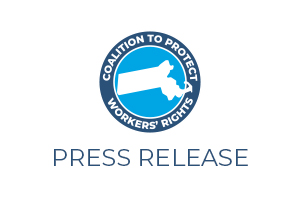New survey: gig economy is increasingly “a tale of two cities.”
Big Tech pushes “second class” status for low wage, mostly Black, Brown and immigrant workers at core of business, while companies expand stock options, health benefits, flexible work for highly-paid employees.
BOSTON – A new survey from The Information, a Silicon Valley tech publication, shows that the gig economy is increasingly a tale of two cities, “giving white collar workers more of what they want,” while denying minimum wages and benefits to millions of low-wage, mostly Black, Brown and immigrant workers.
The report highlights some of the ways that Uber, Lyft, and other tech giants cater to favored high-status employees, offering flexible work arrangements, generous paid leave, and rapidly-vesting stock options. The report notes that Uber, DoorDash, and Lyft have all switched to a one-year “vesting period” for stock options from a previous four-year period, or made other changes to accelerate equity.
“Uber and other gig companies push a false choice, telling drivers and delivery workers that we can’t have basic benefits, while we subsidize huge salaries and lavish benefits for their high-paid executives,” said Beth Griffith, an Uber driver and Chair of the Boston Independent Drivers Guild. “It’s time for Big Tech to follow the law and do right by the workers who make these companies run.”
The survey found that Big Tech employers offered a wide range of generous benefits and flexible work arrangements to favored, high-income workers, none of which are offered to the drivers and delivery workers at the core of the company. The report detailed:
- 59 percent of respondents made more than $200,000 per year. 100 percent made at least $80,000.
- 92 percent of respondents were offered at least 6-10 weeks of paid parental leave, while 55 percent were offered 12 weeks or more;
- 87 percent were offered employer-provided mental health counseling;
- 76 percent received Telehealth benefits;
- 69 percent could work from anywhere in the United States or had no geographic restriction on their place of work.
Earlier this month, the Coalition spotlighted Uber’s new “work from wherever” flexible work policy for high-status employees, offered even while the company falsely claims to drivers and delivery workers that “flexibility” is only for independent contractors, who receive no benefits.
The soaring benefits that gig giants lavish on their corporate employees stand in stark contrast to the $100 million campaign the companies are launching in Massachusetts to avoid paying state taxes, paying workers a minimum wage, or making mileage reimbursements.
The Coalition to Protect Workers’ Rights is a broad alliance of workers, civil rights, immigrant, faith, labor, community organizing, racial and environmental justice groups who believe that all workers in Massachusetts should be able to earn a decent wage, take care of their health, and protect against harassment and discrimination on the job. We oppose the $100M+ campaign by Big Tech companies to undermine our law, as they recently did in California through Proposition 22, to exclude workers from basic rights and exempt themselves from the obligations of every other employer.
Twitter: @noprop22ma | FB: @NoProp22MA | www.noprop22ma.com
# # #

